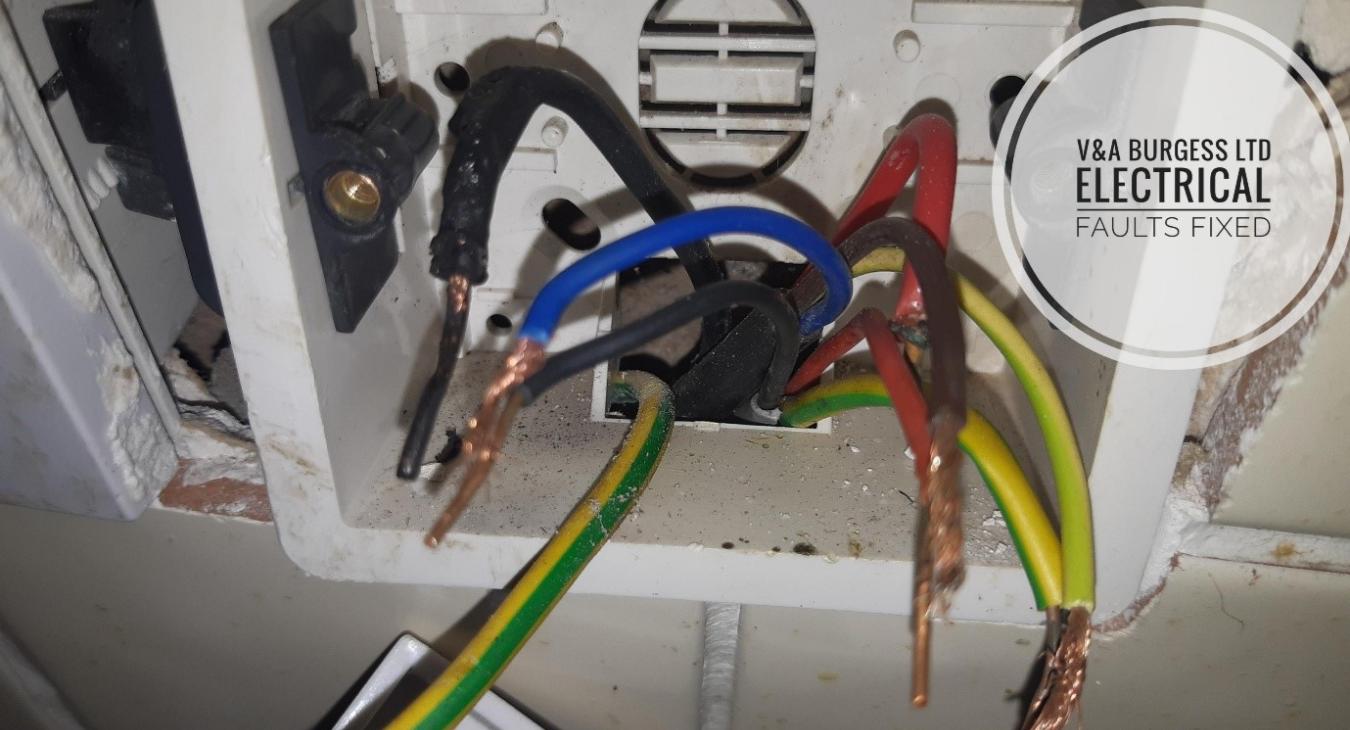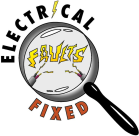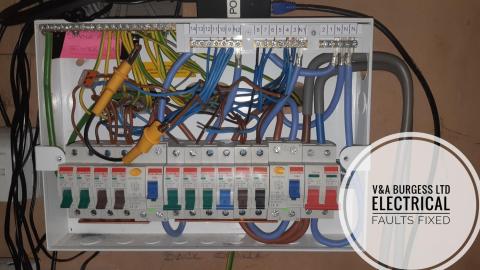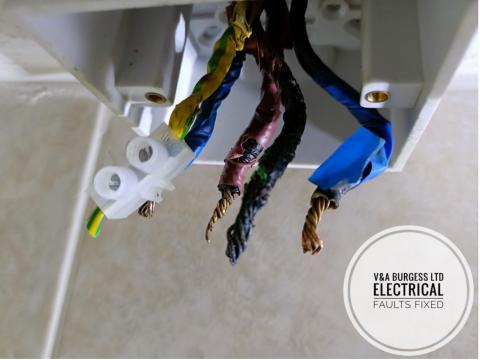
1) What leads to burnt wires?
Our electrical systems in our homes are an incredible feat of modern engineering. These silent systems provide light, heat, and power to all rooms in our homes and do so year after year, flawlessly and without fuss. Electricity flows to our homes at 230 volts alternating in direction 50 times per second. The metal components in the electrical accessories and cables warm up, cool down and also, very slightly… vibrate with the frequency of the ever-changing direction of the current.
This heating and cooling causes expansion and contraction of the metals in our electrical system. This in turn over a long period of time can cause wiring to become loose, screws to loosen and this creates a problem!
When wires become loose….. they form a poor connection for current to flow. This causes heat to build up and eventually wires burn! The photograph shows burnt wires in the back of a fused switch. When we took the switch off to investigate, we discovered the wires simply fell out and the screws were that lose they also fell out. This may have been due to poor installation but so many times it is not. Many times, there has been no electrical maintenance carried out and this can lead to burnt wires.
Back to top2) Undersized Cables?
Of course…. There are other reasons that burnt wires can occur. If the cable is too small for whatever it is feeding then there can be issues with overheating and burnt wires. We check for this type of thing on an electrical inspection. We will check the backs of electrical accessories to make sure the connections are tight enough, that wires are not snagged or trapped and also, to make sure there are no burnt wires.
Back to top3) Electrical Issues in the Bathroom
The favourite place in the house for issues like this to occur is in the bathroom normally. I have lost track of the number of times I have come across burnt wires in the shower switch or in the shower unit itself. The electric shower is a humble little water heater and will dutifully perform its function over several years without an issue.
The problem comes when larger showers are added without changing the cable feeding it, when a shower switch fails and is replaced poorly or with and incorrectly rated shower switch. When these problems happen then we quite regularly see burnt wires.
Back to top4) The Consumer Unit
The other place that we see burnt wires is inside the electric box/consumer unit/fuseboard. These connections are left for decades normally and never checked for correct tightness using a torque screwdriver. When these things are left for an extended period, they can work loose just as we talked about above. I cannot emphasise the importance of occasional electrical safety checks for your home.
It is simply money well spent and can save your wiring, your consumer unit and even a fire. Loose wires cause fires. Burnt wiring is sometimes enough for your fuseboard to sense a problem and turn off the circuit but sometimes there are issues that it cannot detect. Burnt wires are an issue that can be difficult for your fuseboard/electric box/consumer unit to detect. The most modern consumer units can now detect arcing which causes burning and these are becoming more popular with new installations.
Back to top5) What to do?
If you can smell burning, see wires in your home that look brown, blackened or an abnormal colour then please don’t delay. Let us come and investigate for you. Burnt wires is the start of serious problems and can indicate hidden issues that you would be unaware of. Electrical faults can be the start of burnt wiring problems and issues like tripping switches, flickering lights or intermittent power loss should NOT be ignored. Have an electrician investigate the issues by carrying out some fault finding.
Back to top6) What about prevention?
One of the best ways or preventing burnt wires is to have an electrician carry out a periodic electrical inspection for you. The electrical inspection is the best form of prevention against electrical problems occurring. Having your electrical system checked every ten years, as recommended for private domestic dwellings, is vital to ensuring that the operation of the fuse box, trip switches, plug sockets and other electrical equipment is safe and unlikely to cause problems in the immediate future.
Back to top7) Self-Checks
There are also a number of things that you can check yourself and things that you can do yourself to help prevent burnt wires such as:
- Checking for electrical wiring issues
- Inspecting the appliances and plug tops in your home
- Use the right light bulbs / lamps for each fitting
- Inspect the plugs sockets and switches visually
- Don’t overload the electrical outlets and plug sockets in your home
- Be careful with your use of electric space heaters
Checking for electrical wiring issues
There is no doubt many electrical cables that will be on display somewhere in your home. Garages, sheds and around the fuse box are the most common places. Visually check the condition of these cables to ensure they are not discoloured, damaged, showing copper or single coloured insulation.
We have very helpfully compiled an electrical safety check list for you.
Inspecting the appliances and plug tops in your home
The appliances and plug tops in your home can degrade over time. Visually inspect the appliances case and cord to ensure that they are in good condition. Where there is damage, have the appliance repaired, the cord replaced and ensure that they are generally well maintained.
Consider replacing older appliances for new energy efficient models. Check the plug top to ensure that the cable is secure, cannot be pulled out, that there are no single-coloured wires visible outside the plug top, check for signs of mechanical damage and thermal damage, check for discolouration and any cracking.
Use the right bulbs/lamps for each fitting
When checking your lights, see if there is a sticker or data badge somewhere on the light fixture that indicates the maximum wattage of light bulbs that should be used in the fitting. Do not exceed the maximum recommended wattage for the fitting or each of the light bulb holders on the fitting as this could be very dangerous.
Inspect the plug sockets and switches visually
Plug sockets and switches are not designed to last forever, moving parts can wear out, electrical contacts can degrade and the risk of BURNT WIRES can increase with age and use.
Carefully inspect plug sockets and switches to ensure that there are no issues with them. Check for signs of cracking, discolouration, overheating and any impact damage. If you find that you have a loose light switch or a loose plug socket then these should be reaffixed carefully.
Sometimes it is impossible to reaffix loose electrical accessories without the help of an electrician. Don’t risk electrical repairs turning into more costly repairs, its often best to employ the services of an electrician in the first place!
Don’t overload the plug sockets and electrical outlets
Overloading of plug sockets and extension strips can result in serious overheating and electrical fires. These devices are intended for temporary use only and not as a permanent solution to a lack of plug socket outlets in the home.
If extension cords are to be used then it is absolutely vital that the appliances and equipment that is plugged in to them is limited to the maximum safe rating (or below) of the extension lead. The safe rating of extension leads is usually printed on a data badge somewhere on the lead body or power strip.
If you are unsure of the kind of equipment that can be used in an extension lead then check out this handy calculator provided by Electrical Safety First. This interactive calculator will assist you with making safe decisions about equipment in extension leads.
Be careful with electric space heaters
As a rule, electric space heaters are generally used to top up the main heating source for the home. An all-electric heating system in the home will run very expensive and likely not be as warm as Gas central heating systems for example.
Electric fan heaters in particular can present a risk of burning out extension leads. Any electric heating appliance has the ability to demand a high electrical current for a long period and this can cause extension leads to overheat and will lead to BURNT WIRES.
Back to top8) Have old wiring replaced
If your home has not been rewired in the last 60 years then there is a good chance that the existing cabling has seen better days and is a few years from giving up.
The ACTUAL condition of the current wiring and electrical system can only be determined by an electrician and a thorough electrical inspection. A process which takes several hours to conduct properly and thoroughly.
Regardless of this, how long do you think is reasonable to ask a vital system in your home to perform for at its best? 20 years? 40 years?
Most modern copper cabling will last around 40 - 70 years but this does assume a few different things have taken place.
- Minimal wear and tear
- No alterations or only PROFESSIONAL alterations carried out
- Good quality cabling used in initial installation
- A regular schedule of maintenance by an electrician including testing
Without these things then the wiring system will likely fail or become problematic before the estimated lifespan.
Call us if you need any further help or information.
0151 351 4011.
Back to top










